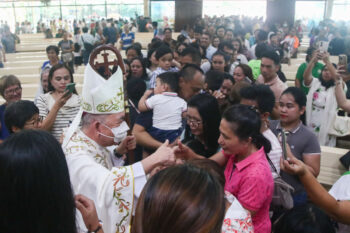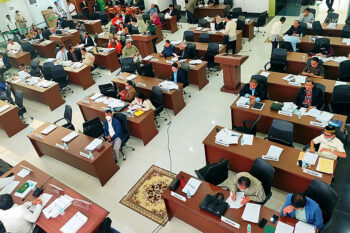3rd of a series
CAGAYAN DE ORO CITY (MindaNews / 16 Sept) — The Bangsamoro Organic Law (BOL) has good provisions on human rights, the justice system, and on regional peace and security. I summarize these provisions in this third article of my series on the law.
Article IX of the BOL lays down the fundamental rights that will be enjoyed by the Bangsamoro, including indigenous peoples. It also specifies certain rights of various sectors of society including women, labor, children, among others.
Rights of indigenous peoples
The rights of indigenous peoples are protected to cover native titles, customs and traditions, justice system, indigenous political structures, and equitable share in the revenues from the utilization of resources, among others. The customary rights of indigenous peoples are also protected and guaranted. The Parliament shall enact laws to this effect and such laws shall not derogate the rights recognized in the United Nations Declaration on the Rights of Indigenous Peoples and the Indigenous People’s Rights Act (IPRA).
It took a lot of effort and lobbying, one that I proudly participated in, to get Congress to assure indigenous peoples that their rights would be respected in the Bangsamoro. It is to the credit of the Moro Islamic Liberation Front (MILF) that it accepted the amendments proposed by the coalition of indigenous peoples during the legislative process. For sure, the MILF has travelled a long way on this issue. I remember how in 2010, when I was a member of the government panel negotiating with them, how difficult it was to even mention indigenous peoples’ rights and particularly IPRA in our agreements.
Just as important as indigenous peoples’ rights, the BOL contains an ironclad guarantee of religious freedom. People of faiths other than Islam should be assured that they can worship as they please without any hindrance. There will be no religious discrimination in the Bangsamoro.
To ensure the protection of the human rights, the BOL creates the Bangsamoro Human Rights Commission. Among others, this commission will cooperate and closely coordinate with the national Commission on Human Rights.
Social justice in the Bangsamoro
The BOL goes beyond the traditional civil and political rights and also includes social justice provisions. Thus, the BOL commands the Bangsamoro to ensure the access and delivery of basic services and responsive health programs, quality education, appropriate services, livelihood programs among others. Housing and human settlements shall also be addressed. The rights of labor to self-organization and participation in decision making process, among others shall also be ensured.
Women’s participation in the Bangsamoro government is guaranteed by giving them a reserved seat in the Parliament and at least one appointment to the cabinet. The Bangsamoro government shall also protect and uphold the fundamental rights of women. Aside from those already mentioned, the rights of children and youth will also be protected, recognizing their vulnerabilities and their role in nation-building. Their total well-being will be protected.
Quality education will be a top priority. The Parliament will create a Tribal University System to address the higher education needs of non-Moro indigenous peoples.
Other vital concerns such as arts and culture, health and science and technology will not be left out as these will also be given priority under the Bangsamoro government.
The Shariah system
The Bangsamoro justice system under Article X of the BOL shall be administered according to the unique cultural and historical heritage of the Bangsamoro. Dispensation of justice is in accordance with the Constitution, Shari’ah, traditional or tribal laws, and other relevant laws. Shari’ah courts shall form part of the Philippine judicial system subject to the supervision of the Supreme Court.
Section 3 of Article X enumerates the sources of Shari’ah divided into primary and secondary sources. The Parliament shall have the power to enact laws relating to Shari’ah including personal, property and family relations. It is also given the power to enact laws relating to commercial and civil action not covered by Presidential Decree No. 1083 or the Code of Muslim Personal Laws of the Philippines and criminal jurisdiction over minors under certain conditions.
The Shari’ah Circuit Courts shall have original exclusive jurisdiction over certain cases involving Muslim parties provided that non-Moro parties will be under its jurisdiction only if he or she voluntarily submits to its jurisdiction.
However, the Shari’ah District Courts shall exercise original jurisdiction in certain cases where either or both are Muslim.
There shall also be a Shari’ah High Court which forms part of the Philippine justice system that will exercise juridiction over certain cases where either or both parties are Muslim. The decision of the Shari’ah High Court will be final and executory except on questions of law where the case may be elevated to the Supreme Court. The Shari’ah High Court is to be composed of five justices including the presiding justice.
The Parliament is authorized to enact laws that promote and support the traditional or tribal justice system. This notwithstanding, the regular courts will continue to function in accordance to national laws.
Correcting historical injustice
The BOL explicitly provides for a transitional justice mechanism to address the historical grievances of the Bangsamoro and the indigenous peoples that arise from discrimination, human rights violations and marginalization. In instances of unjust dispossession, the Parliament is vested with authority to pass laws providing for the reparation of the Bangsamoro people.
As long as the basic rights guaranteed by the Constitution and the BOL are respected, the transitional justice system should work out fine and could even serve as a model for our national transitional justice issues (dealing with the Marcos legacy is not yet done while we have to deal with new challenges like the one posed by the massacre of the poor in the war against drugs). In the meantime, it is important to stop the cycle of injustice. In my view, if we implement the BOL provisions on human rights properly, that will be the case and we will see a better Bangsamoro and Mindanao.
(MindaViews is the opinion section of MindaNews. Tony La Viña of Cagayan de Oro City is former Dean and currently professor at Ateneo School of Government, as well as Constitutional Law professor of Xavier University, University of the Philippines College of Law, Polytechnic University of the Philippines College of Law, De La Salle University College of Law, San Beda Graduate School of Law, Lyceum College of Law and Pamantasan ng Lungsod ng Maynila Graduate School of Law. He was also a member of the government peace panel negotiating with the MILF from January to June 2010 following the aborted signing of the already initialed Memorandum of Agreement on Ancestral Domain in 2008).







